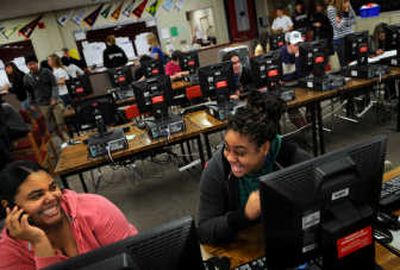Some students have free time instead of WASL

Greg Shintani spent Monday morning killing time in the library at North Central High School while most of his sophomore peers labored over a WASL test.
The 16-year-old took and passed all portions of the high-stakes state exam last year as a freshman, even though it’s not required until 10th grade. While other students not taking the test had the option of arriving late for classes, Shintani rides the bus to the northwest Spokane school and had no choice but to arrive at the regular hour.
“It’s kind of a waste of my time,” Shintani said.
As the Washington Assessment of Student Learning begins for high school students this week, officials are scrambling to find activities to fill the morning hours for students not taking the standardized tests, now required for graduation.
For some, especially freshmen, that means taking college-prep or practice tests. Other students are encouraged to come to school and spend time studying or working on projects.
But for many students, WASL season means time off. Many schools aren’t requiring older students who aren’t testing to be at school until late morning.
WASL reading and writing tests will be administered over the next four days. Math and science tests, pushed back as a graduation requirement by the Legislature last year, will be administered in April.
“We are trying to make this time meaningful for every student and use every minute we have,” said North Central Principal Steven Gering.
At North Central, juniors and seniors were not required to come to school until late morning, but many were encouraged to come earlier and study in the library or the cafeteria, Gering said. Students are also getting extra help preparing for Advanced Placement exams, or working on their culminating projects, also required for graduation.
Freshmen were required to come to school Monday to take a college readiness exam, called Explore. Later in the week they will register for next year’s classes during testing time.
“They don’t really want us wandering around the school,” said Rachel Day, who spent two hours studying in North Central’s library Monday morning.
School officials said they are under even more pressure this year to provide a quiet and secure testing environment for students taking the WASL exams, the state’s answer to the federal No Child Left Behind Law.
“It’s now a graduation requirement, and there’s a lot greater impact than it used to be,” said Melanie Rose, Central Valley district spokeswoman.
Students at both of the Central Valley School District’s high schools who were not participating in the WASL don’t have to be at school until at least 10 a.m. all week.
At University High School, however, some seniors were coming to school to present their culminating projects, officials said.
Rose said this is the first year the Spokane Valley district didn’t find other activities for students not engaged in a WASL exam, because of the growing number of students taking the test at one time.
It used to be just sophomores, but now there are students in the junior and senior classes who are re-taking the exam because they failed to meet standard. Statewide, nearly 20 percent of students have not met standard on the reading and writing sections and face the possibility of no diploma.
“There are just many more variables now,” Rose said.
In addition, with more students it means nearly every staff member is needed to proctor the test, officials said.
All sophomores, and juniors and seniors who have not passed the test, are automatically registered to take the exam, Rose said. There are also a few ninth graders who signed up on their own to take it a year early; about 75 freshmen students signed up between the two Central Valley high schools.
“We are not encouraging that as an option,” Rose, said. “We have enough other kids taking the WASL to keep track of.”
At Rogers High School in northeast Spokane, Principal Carole Meyer said junior and senior students were using the time to work on required community service projects off-campus and on culminating projects. They will not be required to be in class until late morning all week.
Freshmen students are required to be at school, to take practice exams. The only trouble so far has been students arriving late because they forgot to set their clocks forward for daylight savings time.
“Most schools have a systemized approach to the WASL now,” Meyer said. “We’re getting it down to a science at this point.”